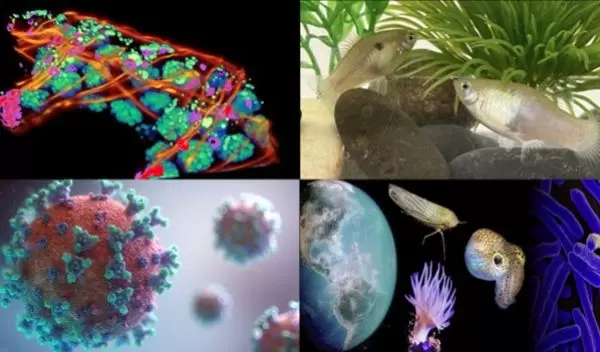
Integrative biological science and training are the focus of 4 new institutes
From understanding the multifaceted transmission of disease to deciphering how living organisms adapt to harsh conditions, answering big questions in biology requires interdisciplinary research and scientists engaging and partnering with those from other fields of study.
The U.S. National Science Foundation has made four related awards totaling more than $38 million over five years. The grants will support the creation of four Biology Integration Institutes that will engage in integrative science.
The awards will support research by 53 investigators at 27 institutions, including three minority-serving institutions, across nine states. Education and training efforts will involve students from kindergarten to the postdoctoral level. The institutes join 10 established facilities with hundreds of researchers across 25 states. Of the 34 states now reached by the program, 13 are EPSCoR jurisdictions.
"Life is complex, takes many forms, and adapts to many environments," said NSF Assistant Director for Biological Sciences Joanne Tornow. "To understand it, we need to bring together researchers from many areas of science, inside biology and outside it. In addition to using integrative science to answer the grand challenges in biology, the institutes will integrate new voices and broaden participation in biology through their education, training and broader impacts work."
The four new institutes are:
- The Viral Emergence Research Initiative, or VERENA, led by researchers at Georgetown University, will use artificial intelligence, machine learning and experimentation to study the ways viruses and their hosts interact, how the evolution of viruses was impacted by and impacts evolution in hosts, and how those interactions are changing due to a warming planet. A Summer in the Capitol program and a monthly learning community will complement other education and training efforts.
- IISAGE — Discovering the Mechanisms and Evolution of Aging Differences Between Females and Males — will investigate the range of mechanisms and processes that impact differences in aging in sexes of the same organism. Led by a team at the University of Alabama at Birmingham, the institute will also include a Research Experiences for Undergraduates program and a citizen science project that will engage K-12 students in after-school programs.
- The Water and Life Interface Institute, or WALII, led by scientists at the Carnegie Institution of Science in Washington, D.C., will study how life interacts with water from the molecular level to organisms across plants, fungi and animals. WALII will have a cross-disciplinary training program with trainees recruited from historically Black colleges and universities, Hispanic-serving institutions and primarily undergraduate institutions. Other education and outreach efforts include lesson plans developed in conjunction with Washington, D.C., teachers and citizen science efforts involving smartphone-connected Foldscopes, or portable microscopes.
- The Institute for Symbiotic Interactions, Training, and Education in the Face of a Changing Climate, or INSITE, will work to predict the potential loss of biodiversity under climate change though studies of microbial communities and their hosts. Researchers at the University of California, Merced, will lead the institute in outreach efforts to rural communities and create a set of portable tools and resources to educate and train students in symbiosis and climate change.
Learn more about Biology Integration Institutes and view the full list of awards by visiting nsf.gov.
